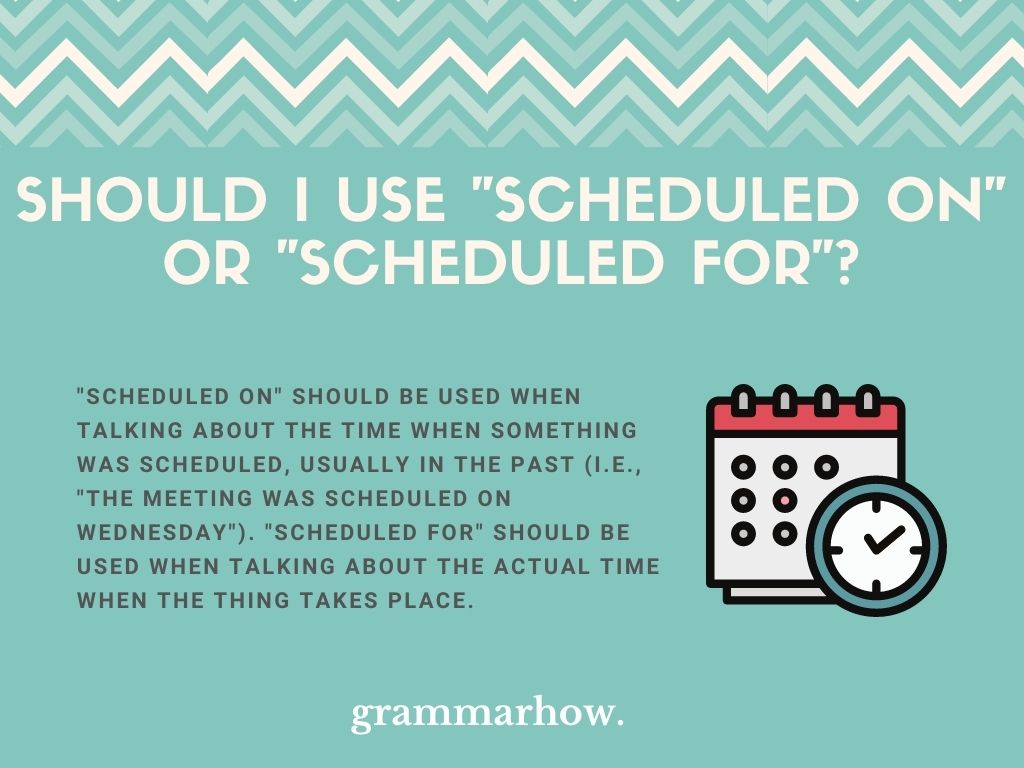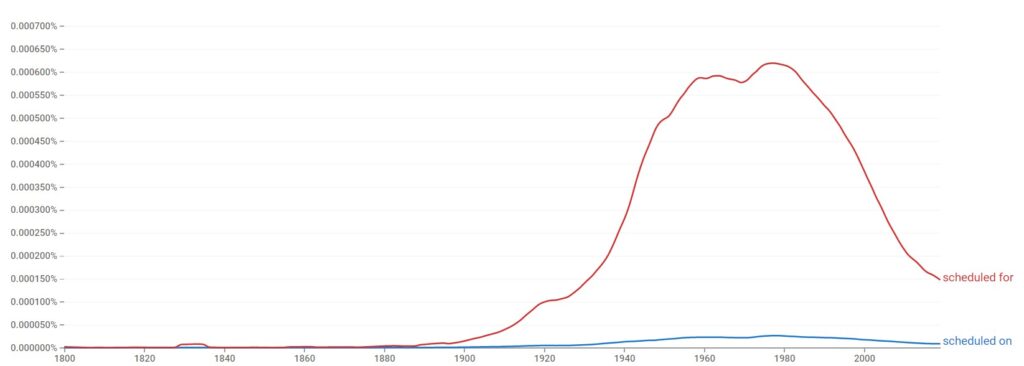Choosing the correct preposition to use after the verb “scheduled” is very important to make sure you’re using the correct meaning. In this article, we’ll look at the differences between using “scheduled on” and “scheduled for” and a few other prepositions.
Should I Use “Scheduled On” Or “Scheduled For”?
“Scheduled on” should be used when talking about the time when something was scheduled, usually in the past (i.e., “the meeting was scheduled on Wednesday”). “Scheduled for” should be used when talking about the actual time when the thing takes place.

When we want to specify the date that something is set, we can use “scheduled on.” It’s usually joined with the auxiliary verb “was” to indicate that it’s the past tense form.
- The meeting was scheduled on Wednesday.
When we want to talk about the date when something is set for, we use “scheduled for” instead. That means that the time we state is when the thing is expected to happen.
- The meeting is scheduled for three o’clock.
There are also ways you can use both interchangeably. Most native speakers won’t mind if you use one over the other as there isn’t a major difference between either.
Is “Scheduled On” Or “Scheduled For” Used The Most?
We like to look through statistics and data to help us to understand the popularity of certain words and phrases.
If you look at this graph, you’ll see that “scheduled for” is the most popular choice of the two phrases. It’s much more common for people to use “scheduled for” in the context when a meeting or event is set for, rather than talking about when it was set in the past.

Due to the likelihood of the contexts, “scheduled for” has always been seen as the correct version of the two. However, “scheduled on” does work to talk about previous dates when things were set but very rarely talk about the actual meeting that takes place afterward.
7 Examples Of How To Use “Scheduled On” In A Sentence
Let’s go through some examples of how we might use the phrases in a sentence. We’ll start with the less popular choice, “scheduled on.”
“Scheduled on” refers to the time when a meeting or event was originally set. It does not talk about when the meeting will take place but rather when the time for it to take place was agreed.
- We had scheduled our meeting on Wednesday.
- The meeting was scheduled on June 18th.
- The event was scheduled on Monday.
- We made sure to schedule it on the weekend!
- Wasn’t this scheduled on Friday?
- We should talk about that debate we scheduled on July 15th.
- They scheduled this on the weekend.
As you can see, we always use the past tense when we’re using “on” as the preposition in this case. It always refers to times that have happened in the past because we already know what the scheduled event was and when it was supposed to take place.
7 Examples Of How To Use “Scheduled For” In A Sentence
Now let’s go over how “scheduled for” might work instead. This is the more popular of the two phrases, so you may have come across a few of these examples (or at least something similar) before.
“Scheduled for” refers to the time when a meeting will take place. It’s often a point in the future, but you can also talk about it in the past if the meeting took place at a specific time previously. It’s never used to talk about when a meeting date was agreed upon.
- I thought we had this scheduled for next week!
- We should schedule this for Tuesday.
- Let’s schedule this for when we’re both free.
- The meeting is scheduled for the weekend.
- The discussion was already scheduled for tomorrow.
- When was this scheduled for?
- They scheduled the meeting for Wednesday night.
We can always put an object between the verb and the preposition. The phrase “scheduled for” still works to the same extent even if we change it to “scheduled the meeting for.” It’s just more specific about the “meeting” that we’re talking about.
Scheduled On Or For – Synonyms
It will help to know some synonyms and alternatives for both of the words. That way, you can look into trying new options that mean the same thing rather than worrying about getting the prepositions correct.
- Arrange
You can arrange a meeting or other similar event just like you can schedule it. Most of the prepositions that come after it are the same too.
- Organize
This is more of a formal choice but another great way to schedule something.
- Plan
We can make a plan for some time in the future, and all the prepositions work for this one too.
Is It Correct Grammar To Use “Scheduled” On Its Own?
There are some cases where we may never need to use a preposition after “scheduled.” It mostly comes down to the content of your sentence.
- I’m scheduled already!
- We scheduled this months ago!
- This has already been scheduled.
We can use “scheduled” on its own when we don’t need to include a time frame for the exact meeting. If it’s more of a general statement that something was set, we use “scheduled” on its own.
Which Other Prepositions Can Be Used After “Scheduled”?
Finally, let’s look at some of the other prepositions we may come across after scheduled.
Scheduled By
If somebody specifically schedules a meeting or event, then it is said to be “scheduled by” them.
- This was scheduled by my manager.
- My chores were scheduled by my parents every day.
Scheduled With
If there’s an overlap of schedules, where two or more things coincide, then we might use the phrase “scheduled with.” It also applies when talking about a person who will be present in the meeting.
- This meeting is scheduled with another already set.
- Your disciplinary is scheduled with the CEO.
Scheduled To
“Scheduled to” is used when you are required to do something or perform an action at a specific time.
- You are scheduled to meet my parents today.
- We have you scheduled to have a meeting this evening.

Martin holds a Master’s degree in Finance and International Business. He has six years of experience in professional communication with clients, executives, and colleagues. Furthermore, he has teaching experience from Aarhus University. Martin has been featured as an expert in communication and teaching on Forbes and Shopify. Read more about Martin here.
